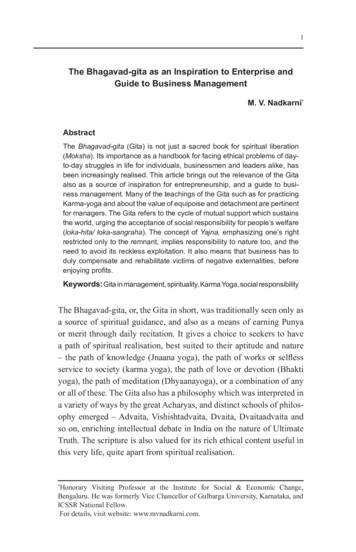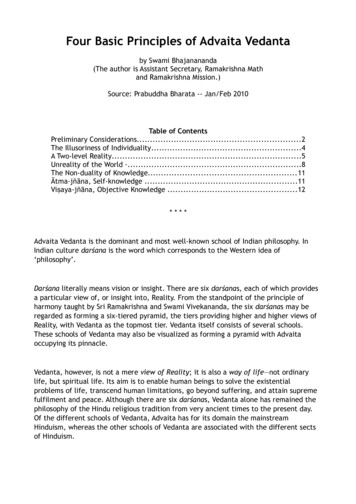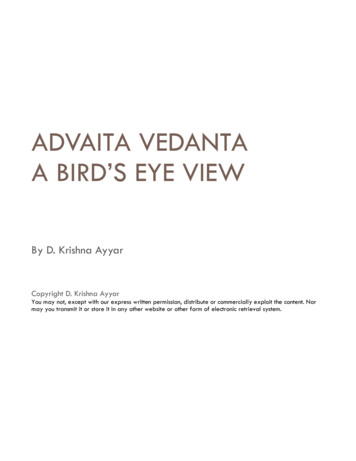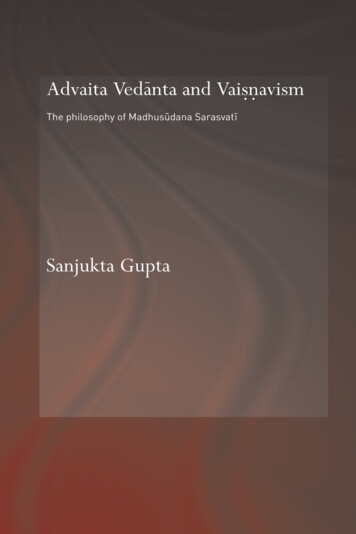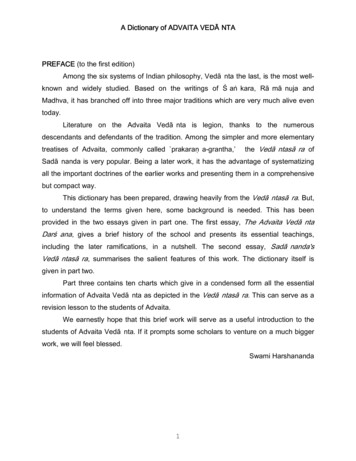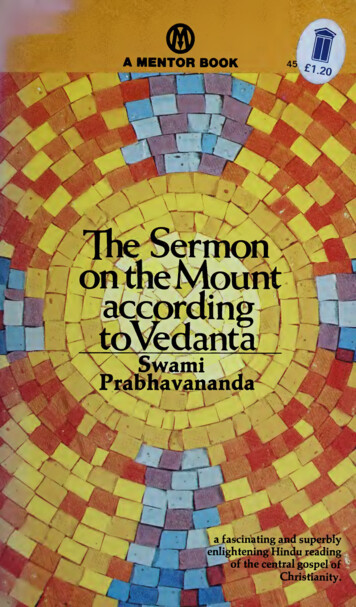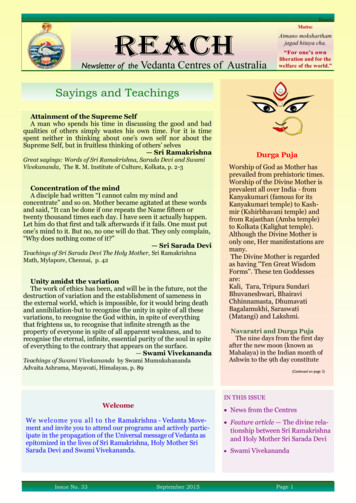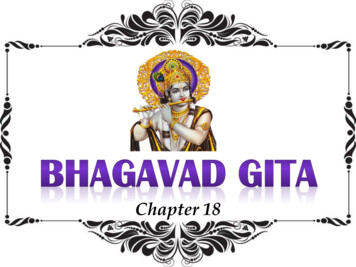
Transcription
Chapter 18
INDEXS. No.XIXTitlePage No.Chapter 181. Summary12. Verse 123. Verse 264. Verse 3115. Verse 4146. Verse 5177. Verse 6198. Verse 7219. Verse 82210. Verse 92411. Verse 102612. Verse 112813. Verse 1230
S. No.TitlePage No.14. Verse 133215. Verse 143516. Verse 153917. Verse 164118. Verse 174519. Verse 184920. Verse 195221. Verse 205422. Verse 215723. Verse 225924. Verse 236125. Verse 246426. Verse 256627. Verse 266828. Verse 2772
S. No.TitlePage No.29. Verse 287530. Verse 297831. Verse 308132. Verse 318633. Verse 329034. Verse 339335. Verse 349536. Verse 359837. Verse 3610038. Verse 3710239. Verse 3810540. Verse 3910841. Verse 4011142. Verse 4111443. Verse 42117
S. No.TitlePage No.44. Verse 4312045. Verse 4412346. Verse 4512647. Verse 4612948. Verse 4713449. Verse 4813850. Verse 4914151. Verse 5014452. Verse 5114753. Verse 5215254. Verse 5315555. Verse 5415956. Verse 5516257. Verse 5616558. Verse 57167
S. No.TitlePage No.59. Verse 5816960. Verse 5917361. Verse 6017662. Verse 6117963. Verse 6218364. Verse 6318765. Verse 6419066. Verse 6519367. Verse 6619668. Verse 6721069. Verse 6821470. Verse 6921671. Verse 7021872. Verse 7122273. Verse 72225
S. No.TitlePage No.74. Verse 7322875. Verse 7423276. Verse 7523477. Verse 7623778. Verse 7723979. Verse 7824280. Concluding Verse246
Chapter 18Moksha Sanyasa Yoga78 Verses4 TopicsSadhana TrividamKarma YogaJnana YogaUpasamhara7 TopicsPreparation ofJnana YogaDirect means ofliberation, nKnowledgeActionDoerSukhamDrithiBuddhiPleasure, JoyWill PowerIntelligence1
Verse 1 :Arjuna said : I desire to know severally, O Mighty-armed, the essence or truth of renunciation,O Hrskesa, as also of abandonment, O slayer of Kesi (Krsna)[Chapter 18 - Verse 1]a) Arjunah Uvacha : Arjuna asked.b) Mahabaho Hrisikesa : Oh Mighty armed Krishna.c) Keshinishudana : The destroyer of Kesi.d) Ichhami : I desire.e) Veditum : To know.2
f) Tattvam : The true nature.g) Sannyasasya : Of Sannyasa.h) Cha Tyagasya : And of Tyaga.i) Pritak : Distinctly.Chapter 4Jnana Karma SannyasaChapter 5Sannyasa YogaChapter 18Sannyasa which gives MokshaI) Karma Sanyasa : Giving up action, studying and remaining in Jnanam is Karma Sannyasa.II) Jnana Karma Sannyasa : Removing individuality by Jnanam or by gaining ultimate knowledge of pureconsciousness. By knowing Aham Brahma Asmi, one totally gives up thought Aham Jivosmi. No individual exists even to take Sannyasa is Jnana Sanyasa.3
18thChapter – Summary of 17 chapters, essence of all Vedas. Intent of teaching – for everyone to be happy always. Bhagavan has removed Arjunas sorrows by teaching Jnana Shastra. It removes Agyana, ignorance, cause of sorrow.Arjuna said : If it be thought by you that ‘knowledge’ is superior to ‘action’, O Janardana, whythen, do you, O Kesava, engage me in this terrible action? [Chapter 3 – Verse 1]Arjuna said : O Krsna! You praise renunciation of action and again yoga – performance ofaction. Tell me conclusively that which is the better of the two. [Chapter 5 – Verse 1]4
In Verse 1 – Chapter 18 : Arjuna requests for clarity between Sannyasa and Tyaga.Tyaga- Give up fruits of action,Karma Phalam.Sanyasa- Give up action. This is general understanding.5
Verse 2 :The blessed lord said : The sages understand Sannyasa to be the renunciation of work withdesire; the wise declare the abandonment of the fruits of all actions as Tyaga.[Chapter 18 - Verse 2]a) Sribhagavan Uvacha : The Lord said.b) Kavayah Viduh : Sages regard.c) Nyasam : The renunciation.d) Kamyanam Karmanam : Of desire – born actions.6
e) Sannyasam : As Sannyasa.f) Vichaksanah Prahuh Sarvakarma Phala Tyagam : The learned people declare that.g) Sarva Karma Phala Thyagam Tyagam : The renunciation of the results of all actions is Tyaga.General understanding :Sanyasa- Giving up Karma.- Give up homeThyaga- Giving up Laukika Phalam, materialbenefit for the sake of attainingJnanam about Atma Sukham.- Karma Yoga, householders lifestyleKaivalya Upanishad :Not by deeds, nor by progeny, nor by wealth, but by renunciation alone have some peopleattained immortality. That which the renunciates attain is beyond the heavens, yet it shines inthe cave of the heart (the intellect). [Verse 3]7
I) Kavayaha Vichakshana : Panditas, learned elders who have analysed shastras well.II) Kamyanam Nyasam Sanyasam Viduhu : Sanyasa is giving up Kamya Karma or action prompted by desire.III) Vichakshana, Sarva Karma Phala Tyagam : Giving up Kamya Karma Phalam, Svarga Phalam, giving that up is Sanyasa.Sarva Karma Phala Tyaga : Sandhya Vandanam, marriage rituals, rituals on Death, etc.IV) Thyaga : Giving up desire for material benefits for the sake of Chitta Shuddhi is Thyaga.Sanyasa- Kamya Karma Sanyasa byMumukshus.Thyaga- Sarva Karma Phala Tyaga.- Get Chitta Shuddhi.- Not giving up Nitya NaimittikaKarmas.V) Prahu Thyagam Vichakshana : To attain Moksha, give up Kamya Karma.8
Karmas- LaukikaKarma- Nishida /PratishedaKarma.- Not lie, hurtothers, doPapaKarmas.- PrayaschittaKarma.- Done withMantras.- To nullifyeffects ofpast KarmaPhalams.- KamyaKarmaVeidikarituals fordesiredresult- NityaNaimittikaKarma Our bad deeds get registered as Papas and affect us. Good deeds get registered as Punya. Effect of our deeds and results are Adrishta. Function of it can’t be correlated logically. If we do a good deed, it will get converted into Punyam, give Sukha or benefit in duecourse. Such result may not be immediate. If we make a mistake it will get converted to a Papa and will give Dukham, sorrow indue course. Have deep Sraddha in this.9
Nitya Karma – daily, monthly, yearly. Naimittam – Event based like child birth, death, etc. Can’t be stopped for any reason out of laziness or lack of Sraddha. Do Nitya Karmas and give up fruits of actions, Sarva Karma Phala Tyaga. Sarva Karma excludes Kamya, Prayashchitta, Nishiddha Karma. It includes Nitya Naimitta Karma. Karma Phala Tyaga is taught to an aspirant who desires Moksha. Karmas have to be done, sacrifice fruits of action is teaching of this verse.10
Verse 3 :All actions should be abandoned as evil, declare some philosophers; while others (declare)that acts of sacrifice, gift and austerity should not be relinquished. [Chapter 18 – Verse 3]a) Eke ManisinahPrahuh Iti : Some thinkers declare that.b) Karma Tyajyam Dosavat : That action is to be renounced as evil.c) Cha Apare Iti Yajnadanatapah Karma Na Tyajyam : Where as some other declare that activity in the form of Yajna, charity, and austerityshould not be given up. What is renunciation for Moksha?11
Tyaga- Only giving up Laukika Phalamwithout giving up Karma.- Obtain Chitta Shuddhi.- Karma Yoga Sadhaka- Must do Yagya, Danah, TapasKarmasSannyasa- Totally giving up Laukika andVeidika Karma.- Worldly transactions and ritualsgiven up.- Study Vedanta and dedicate toSravanam, Mananam,Nididhyasanam.- Jnana Yoga Sadhaka. Some learned scholars who give importance to renunciation say that Karmas arefraught with shortcomings. They create bondage, attachment to body, result in future births, have Doshas,deficiencies.Another Interpretation : Doing Karma itself is a mistake because Atma is Akarta. When we do action, the thought that Atma does not have Karma gets disturbed. One can give up Kamya and Prayaschitta Karma.Done out of desireKarmaDone to offset sin12
No one should do Nishidda Karma or forbidden actions. One should not give up rituals, charity, performing Penances. This instruction is meant for Ajnanis who are meant to do 3 actions for Chitta Shuddhi,maturity of mind. This instruction not for Mumukshus, spiritual aspirants seeking Jnanam. No difference between Tyaga and Sannyasa. 2 words in different contexts convey same meaning.13
Verse 4 :Hear from me the conclusion or the final truth about this abandonment, O best of theBharatatas; abandonment, verily, O Best of men, has been declared to be of three kinds.[Chapter 18 - Verse 4]a) Bharatasattama : Oh Arjuna!b) Srnu Me Nishchayam : Listen to my verdict.c) Tatra Tyage : Regarding renunciation.d) Tyagah Hi Samprakirtitah Trividha : Renunciation is said to be threefold.e) Purusa Vyagra : Oh Arjuna!14
4 different thoughts(I) Kamya KarmaSannyasa- Give up actionswith selfishdesires(II) Tyaga- Giving up fruitsof actions.- Laukika Phalagiven up.- Veidika Phala,spiritualbenefits notgiven up.(III) Yagya DanaTapah Na Tyajyam(IV) Sarva KarmaParityaga- Until mindattains maturity.- All actionsshould be givenup.- No action freeof deficiency. When mind attains maturity, one may accept Sannyasa or live with Sannyasa Buddhi. If one has Sannyasa Buddhi, one should continue Yagya, Dana, Tapas. After accepting Sannyasa, no need to do Yagya, Danam, Tapas. Aim of Shastra to study Vedanta and know ultimate truth. Yagya, Dana, Tapas has strength of giving more Laukika Phalam and less maturity ofmind. Spiritual aspirant does not aim at Laukika Phala.15
Aims at Moksha. Arjuna, greatest in Bharatha clan. Hear my conclusive words with respect to Tyaga. Tyaga is of 3 types. Purusha Vyagra – Arjuna, tiger among men!16
Verse 5 :Acts of sacrifice, Charity and austerity should not be abandoned, but should be performed;worship, Charity, and also austerity, are the purifiers of even the ‘wise’. [Chapter 18 - Verse 5]a) Yajnadana Tapah Karma : Activity in the form of Yajna, charity, and austerity.b) Na Tyajyam : Should not be given up.c) Tat Karyam Eva : It has to be performed, necessarily.d) Yajnah, Danam, Cha Eva Tapah Pavanani Manisinam : Yajna, charity and austerity are purifiers to the devout people. Yagya, Dana, Tapah should not be given up as they are means to Jnana Yogyata,qualifications for Aquiring knowledge of Absolute reality.17
It is said from point of view of spiritual aspirant who wishes to purify mind for aquiringJnana to attain Moksha. Yagya includes Pancha Maha Yagya.Yaga (Ishvara Aradhana,fire rituals, Puja)DevaPitruBhutaManushyaBrahmaPavanani Manishinam : Purify mind, prepares mind of spiritual aspirant. Chapter 17 – 3 types of Tapas, body, mind, speech, recall here. Giving up desires for material benefit purifies mind. Desire for material benefit is a Dosha, deficiency, not pure impurity of mind, notmaturity of mind. To cultivate that Yajna, Dana, Tapah required.18
Verse 6 :But even these actions should be performed leaving aside attachment and the fruits, O Partha;this is my certain and best belief. [Chapter 18 - Verse 6]a) Tyaktva Sangam Cha Phalam : Renouncing attachment and the results.b) Etani Karmani Api tu Kartavyani : These actions alone are to be performed.c) Iti Me Nishchitam Uttamam Matam Partha : This is my considered and the best teaching, oh Arjuna. Yagna, Dana, Tapas is part of Nitya Naimitta Karma. One should give up attachment to action. Detachment from karma means no tention, restlessness. Do Karma because Bhagawan has commanded it and not do out of selfish interest.19
It should be done for society with responsibility. Karmas ordained in Vedas for everybodys welfare. One should act sacrificing both Karma and Phala. Sacrificing Phala means giving up desire for material benefits including Svarga, workingwithout tention, restlessness. Doing these Karmas will only give Chitta Shuddhi. Krishna says, this is my great opinion.20
Verse 7 : Tamas TyagaVerily, the renunciation of ‘Obligatory actions’ is not proper; the abandonment of the samefrom delusion is declared to be Tamasika(Dull). [Chapter 18 - Verse 7]a) Sannyasah Niyatasya Karmanah Na Tu Upapadyate : Renunciation of obligatory actions is not proper.b) Tasya Parityaga Mohat Parikirtitah Tamasah : Its renunciation out of delusion is said to be Tamasic. If one wishes to give up Mandated Karmas mindless of consequences, due to delusion,ignorance, careless attitude, Aviveka, lack of discrimination, it is Tamasa Tyaga. Sannyasa in 1st line and Tyaga in 2nd line both means giving up, Renouncing. We interpret them differently depending on context in reality. Renouncing action, not good for self or society. All said from spiritual point of view, not materialistic point of view. To give up action due to delusion and lack of Sraddha in Shastra is Tamasa Tyaga. It should not be done, it will lead to Papa. This has been said by Shastras and elders.21
Verse 8 :Rajasa TyagaHe who, from fear of bodily trouble, abandons action because it is painful, thus performing aRajasika (Passionate) abandonment, obtains not the fruit of abandonment.[Chapter 18 - Verse 8]a) Kayaklesha Bhayat Yat Tyajat Karma Iti Dukham Eva : Out of fear of Physical strain suppose one gives up the duty considering it to betrouble some.b) Krtva Rajasam Tyaga Saha Na Eva Labhet Tyaga Phalam : Having taken to Rajasic Renunciation, he never gets the result of renunciation. Karma gives sorrow, hence difficult. Avoid Karma not out of delusion but out of physical exertion in performing it. He will not get fruit of such renunciation. He will not get Moksha through Chitta Shuddhi and Jnana Prapti. Purity of mind helps one to aquire knowledge.22
Giving up action due toIgnoranceDifficultyTamasa TyagaRajasa TyagaView should be : Todays effort is tomorrow’s Joy.One thinks : Todays comfort more important than tomorrows joy is Rajasa Tyaga.23
Verse 9 :Whatever ‘obligatory action’ is done, O Arjuna, merely because it ought to be done,abandoning attachment and also fruit, that abandonment is regarded as Satvika(Pure).[Chapter 18 - Verse 9]a) Tyaktva Sangam Cha Eva Phalam : Renouncing attachment and the result.b) Yat Niyatam Karma Kriyate : Suppose the obligatory action is performed.c) Iti Eva Karyam : With the attitude that it should be done.d) Sa Tyaga Matah Sattivikah Arjuna : That renunciation is considered Sattvic, Oh Arjuna. He does not hate a disagreeable work nor is he attached to an agreeable one.24
I) Yat Karma Niyatam Ith Eva Kriyate : Do Karma ordained by Shastras.ShastrasNityaNityatam- Daily- On Occasions- Child birth Does good for Jiva. Sangam Tyaktva : Give up desire to drop these Sattvika Karmas. I am doing as commanded by Bhagavan for society. I am not doing it out of my own will. There are specific fruits of actions for certain Karmas such as Svarga or in this life asper Shastra. Give up fruits of action as well as attachment for action.Sattvic KarmaPerforming action with Sraddhaand BhaktiGive up fruits, Passion anddoership25
Verse 10 : Glory of Sattvika TyagaThe abandoner, soaked in purity, being intelligent with all his doubts cut asunder, hates notdisagreeable action, nor is attached to an agreeable action. [Chapter 18 - Verse 10]a) Sattva Samavistah Tyagi Medhavi Chinnasamsayah : Established in Sattva, a renouncer becomes wise, free from all doubts.b) Na Dveshti Akushalam Karma Na Anusajjate Kushale :I) Akushalam Karma Na Dveshti, Kushala Karmani Na Anushajjate Sattva Sama Vishtaha TyagiMedhavi Chinna Samshaya One who does not have desire, dislike in actions, does feel averse to do, what he isunable to do well. It is not right to do anothers duty but doing ones own Karma is right, despite oneserror and deficiencies. Generally it is a Dosha, to hurt or kill a person, Samanya Dharma. In war, killing enemy is Punya Karma, Dharma.26
Akushalam Karma means Karma with Dosha. Neither happy or sad doing duties mandated by Shastra. Do duty responsibly and with a mind set I have to do it, Sattva Samavishtaha, Tyagi,Renunciate. Medhavi, deep rooted in Shastra has no doubt regarding either Dharma Shastra orTattwa Shastra, philosophy. Does Loka Sangraha.II) Akushale Karma Na Dveshti Kushale Karmani Cha Na Anushajjate : It is very difficult to determine Dharma, Adharma, who should do what, where, keepschanging. Intelligence is in doing what one is ordained to do at the right place, time, withoutdesire or hate. His Tyaga, responsibility, being unattached in Action, are all great. Has no doubt or confusion, predominately Sattvic. Bhagawan appreciates such a Karma Yogi here.27
Verse 11 :Verily, it is not possible for an embodied being to abandon action entirely, but he, whorelinquishes the fruits of actions, is verily called a ‘relinquished’(Tyagi). [Chapter 18 - Verse 11]a) Dehabrta Nahi Shakyam Tyaktum Karmani Aseshataha : By one who is identified with the body, it is not all possible to renounce actionscompletely.b) Tu Saha Yah Karma Phala Tyagi Abhidhiyate Iti Tyagi :I) Krishna teaches important point in this verse.Gita : Chapter 3 – Verse 528
Verily, none can ever remain, even for a moment, without performing action; for, everyone ismade to act helplessly, indeed, by the qualities born of prakrti (nature). [Chapter 3 – Verse 5] It is not possible for one with body to give up Karma totally. Ajnani can never stay without doing Karma. His nature drives him to action because his senses are not within his control. Until one aquires Jnanam, it is not possible for one to remain quiet. Dehabrutu – Jiva in human.II) Body : Gita – Chapter 3 – Verse 17But, the man who rejoices only in the Self, who is satisfied with the Self, who is content in theSelf alone, for him verily there is nothing (more) to be done. [Chapter 3 – Verse 17] Jnani can remain quiet, resolved. Ajnani – can’t renounce Karma totally but can do Nitya, Naimitta Karma responsiblyand renounce fruits of action.III) One who renounces material wealth and sense pleasure is called a Tyagi.29
Verse 12 : Essence of Karma YogaThe threefold fruit of action - Evil, good and mixed - Accrues after death, only to those whohave no spirit of abandonment; never to total relinquishers. [Chapter 18 - Verse 12]a) Anishtam, Ishtam Cha Mishram : Disagreeable, Agreeable, and mixed.b) Trividham Phalam Karmanah : This is the threefold result of action.c) Bhavati Atyaginam Pretya : It accrues to non-renouncers after death.d) Tu Na Krachit Sannyasinam : But never to the renouncers.30
I)Result of ActionAnishtamIshtam- Unpleasant- Hell- Lower birth- Pleasant- Deva Shariram- Great comfortMishram- Mixture of likes anddislikesII) Atyaginam Pretya : One who has not renounced fruits of actions, may get animal, human, higher births. One has to give up attachment over result of Karma to attain Chitta Shuddhi.Gita : Chapter 62nd1st- Karma Phala Sanyasa- Karma Sanyasa- One who has done this done notget 3 effects of action.- Gains Chitta Shuddhi, Jnanam, Moksha. Important sloka for means to Moksha by Jnanam.31
Verse 13 : 5 Aspects of ActionLearn from me, O Mighty-armed, these five causes for the accomplishment of all actions, asdeclared in the Sankhya (Upanishad) system, which is the end of all actions.[Chapter 18 - Verse 13]a) Mahabaho : Oh Arjuna!b) Nibodha Me Etani Pancha Karanani Siddhaye Sarvakarmanam : Know from me the following 5 factors required for the accomplishment of all actions.c) Praktani Sankhye Krtante : They are mentioned in the Vedanta which is the culmination of action. Eh Mahabaho – Broad shouldered Arjuna. What are 5 aspects which cause action – listen from me. Topic of Sanyasa – Tyaga differentiation is over. Understand what is Karma from Sankhya Shastra. Brahma – Atma Aikyam taught through Kshama, Dama, Padarthas.32
Vedanta :To know Aikya Jnanam,must controlSense organs(Running into the world)Mind(Emotions)Intellect(Thoughts) All Karmas are for the Sake of aquiring Jnanam, wisdom.Gita :Superior is knowledge – sacrifice to sacrifice with objects, O Parantapa,. All actions in theirentirety, O Partha, culminate in Knowledge. [Chapter 4 – Verse 33]33
To the brahmana who has known the Self, all the Vedas are of as much use as is a reservoir ofwater in a place where there is flood everywhere. [Chapter 2 – Verse 46] To know culmination of Karma is Jnanam, must know aspects contributing to Karma. Jnanam is final fruit of Karma. Get knowledge of Karma, get purity of mind, attain Jnanam and Moksha.34
Verse 14 : 5 Aspects of KarmaI believe all this, that you say to me as true, O Kesava; verily, O Blessed Lord, neither the devasnor the Danavas know Your manifestation (Identity). [Chapter 10 - Verse 14]a) Adhishtanam : They are the body.b) Vividha Cha Prothak Cheshta : The many and varied functions.c) Prthagridham Cha Karanam : Various instruments.d) Tatha Kartha : The doer.e) Cha Eva Daivam : And the presiding divinity.35
f) Pancham Atra : Which is the fifth among these.5 Aspects of KarmaAdhishtanamPrithak CheshtahKaranamKartaDeivamI) Adhishtanam :Tattwa Bodha :What is the subtle body? That which is composed of the five great elements which have not undergone grossification,born of the good actions of the past, the instrument for the experience of joy, sorrow etc, constituted of seventeen items,namely, the five sense organs of perception, the five sense organs of action, the five pranas, the mind and the intellect - isthe subtle body. [Verse 11.1] Shariram – Sukha Dukha Bhoga Ayatmam. Site of Karma, locus of Karma, is the body.36
II) Prthak Cheshta : Desires, Joy, sorrow, lie in the body. Functions of the body, Prana, Apana, Vyana, Udana, Samana, are different movementsin performing action – Pancha Pranas.III) Karanam : 5 Jnana Indriyas. 5 Karma Indriyas. Manas. Intelligence 12. Karanams have 12 distinct aspects but are inseparable from the Shariram. All actions happen with the mind, eyes – ears – tongue – skin – nose bring differentinformation from the world. The mind Analyses and puts organs of action into motion.IV) Karta : Vijnamaya Purusha, ahamkara, reflected consciousness in the Buddhi, Jiva.V) Deivam : Adhishtana Devatas of all Karanas. One cannot perform action without the power behind Pancha Pranas and Karanas.37
EyesSuryaEarsDik Unseen power behind KaranamTo do Action needOrgans of ActionBody with 5 PranasMindSpeech One should know 5 aspects of Karma before Atma Jnanam.38
Verse 15 : Nature of KarmaVerily, You yourself know yourself by yourself, O Purusottama, (Supreme Purusa), O source ofbeings, O lord of beings, O God of gods, O ruler of the World. [Chapter 10 - Verse 15]a) Ete Pancha Hetavah Tasya : These five are the causes of any action.b) Yat Karma Naraha Prarabhate Sharira Vangmanobhih : Whatever action a person undertakes with the body, the speech or the mind.c) Va Nyayoyam Va Viparitam : Whether it is righteous or otherwise.5 Aspects of KarmaAdhishtanamKartaKaranamPritak CheshtahaDeivam39
Do’s and don’t’s of Shastras only applicable to human beings.3 Instruments of KarmaSharira- BodyWang- Speech- ConversationsManas- Mind- Thoughts Praying to God, thinking of God, Mantras Action. Thought is action. 5 Aspects common to all types of actions whether in line with Shastras or not, Dharmicor not, doing as Mandated by Shastras or not. Without 5 factors, not possible to do Dharmic or Adharmic actions, good or badactions.40
Verse 16 :You should indeed, without reserve, tell me of your divine glories by which You exist pervadingall these worlds. [Chapter 10 - Verse 16]a) Tatra Evam Sati : This being so,b) Tu Yah Pasyati Kevalam Atmanam Kartaram : He who looks upon the pure self as the doer.c) Akrtabuddhitvat : Due to Lack of a refined intellect.d) Na Pashyati : Does not see.e) Saha Durmatih : He has a distorted vision.41
I) It is ignorance to think Atma as the doer. We all think we are doer. Atma is Nitya Akarta – in chapter 4 – 5. Same here. One who thinks Atma is doer is Durmati, ignorant. He does not put his intelligence to proper use.II) It is actually the 5 factors which are causes of all actions, not Atma.III) One who thinks self as Karta has only Vyavaharika Drishti, not Paramartika Drishti,Absolute Angle. In Paramartika Drishti, absolute angle, self is non-dual.Gita :The fourfold caste, has been created by Me, according to the differentiation of guna andKarma; though I am the author thereof, know Me as non-doer and immutable.[Chapter 4 – Verse 13]42
Though I am creator of universe, know me to be Akarta.He, who recognises inaction in action and action in inaction is wise among men; he is a yogiand a true performer of all actions. [Chapter 4 – Verse 18] How to comprehend action in inaction and inaction in action. Akarma in Karma, Karma in Akarma.Brahman is the oblation; Brahman is the clarified butter, and so on, constituting the offerings;by Brahman is the oblation poured into the fire of Brahman; Brahman verily, shall be reachedby him who always sees Brahman in all actions. [Chapter 4 – Verse 24]43
Asamskruta Buddhitva, one who thinks Atma is Karta, has not matured with teachingof Guru and Shastra. One who does not understand Advaita Siddanta thinks himself as Karta. Even if Nyaya Shastra teaches Deha Vyatirikta Atma, they think Atma is not body but isa doer, Karta.Saha Durmati na Pashyami : Such a person is not matured, does not know the ultimate truth.Shankara in Baja Govindam :One ascetic with matted locks, one with shaven head, one with hair pulled out one by one, anotherparading in his ochre robes – these are fools who, though seeing, do not see. Indeed, these differentdisguises or apparels are only for their belly’s sake. (Seek Govinda, Seek Govinda.) [Verse 14] Though truth is so evident, mind does not perceive it. One thinks oneself as Karta, Samsari. Self is Akarta is inner meaning of verse 16.44
Verse 17 :He, who is free from the egoistic notion, whose intelligence is not tainted (by good or evil),though he slays these people, he slays not, nor is he bound (by the action).[Chapter 18 - Verse 17]a) Saha : He.b) Yasya Na Bhavah Ahankrtah : Who does not have the notion, I am the doer.c) Yasya Buddhih Na Lipyate : And whose intellect is not affected.d) Na Hanti : Does not kill anyone.e) Api Hatva : Inspite of killing.45
f) Iman Lokan : These people.g) Na Nibadyate : Nor is he bound.I) One who studies Shastras and has mature mind, Samskruta Manaha, has understood Shastralogically, has no Doership. Atma is Akarta, Abokta, taught in 2nd chapter. Ahamkara is individuality, Doership. Atma has no Kartrutvam or Karma.II) Yasya Buddhi Na Lipyate : Whose Buddhi is not stuck to Karma Phalam or Karma. Buddhi is intellectual capacity, Shakti. Has cognized that Atma has no Kartrutvam, by study of Shastras. Only Anatma, Ahamkara, has Kartrutvam and Boktrutvam.AhamkaraBody, Mind, Reflected consciousnessHas Samsara and BondageMithya46
Atma – Real, has no bondage ever free. What happens when one has this knowledge?III) Saha Imam Lokan Hathvapi Na Hanti : Whoever is destroyed in this universe, is getting killed by the Law of Karma.He, who takes the self to be the slayer and he, who thinks he is slain; neither of them knows.He slays not, nor is he slain.[Chapter 2 - Verse 19]IV) Na Nibhadyate : No one kills him or does he kill someone, from Atma standpoint, Paramartika Drishti,Absolute angle. From Relative Angle, killing is Sin. Kshatriya doing Dharma Yuddham is reaping Punyam. In relative angle, Dharma Adharma rules apply. Dharma always relative, depending on position, circumstances.47
Having made pleasure and pain, gain and loss, victory and defeat the same, engage in battlefor the sake of battle; thus, you shall not incur sin.[Chapter 2 - Verse 38] Benefit of this knowledge : One will follow Dharma, not incur sin. Fruits of action do not bind him.Sumathi- Considers Atma as Akarta,Abokta.Durmati- Considers Atma as Karta,Bokta.48
Verse 18 : Important Verse – Concluding lines of Karma YogaKnowledge, the known and the knower form the threefold impulse to action; the organs theaction, the agent form the threefold basis of action. [Chapter 18 - Verse 18]a) Parijnata, Jneyam, Jnanam : The knower, the knowable, and the knowledge.b) Trividha Karmachodana : This is the threefold cause of action.c) Karta, Karma, Karanam Iti Trividhah Karma Sangrahah : The doer, the object and the instrument, this is the threefold frame of action.49
Karma YogaWhat prompts action ingeneralWhat constitutes action /Implements actionKarma ChodanaKarma SangrahConsumer,knower, BoktaKnowableKnowledgeDoerObjectInstrumentPari JnataJneyamJnanamKartaKarmaKaranam Mind has capacity to know, there are objects of knowledge (Jneyam) and there isdesire to enjoy, experience objects of knowledge. This prompts action, Karma.Doer- Identifies with body- KartaInstrument- Karanam- 5 Jnana Indriya 5Karma Indriya Mind(To plan action)Object- Karma50
Mind’s FunctionKnowing- One aspect of Mind.Planning and implementing- Organises Karanams toperform action. Here knowledge is Samanyam – general Jnanam not Brahma Jnanam. Karta with desire to experience, object of knowledge, uses Karanam to experience,Jnana Indriyas. For action, doer, organs of action, mind to plan and implement action required.51
Verse 19 :Knowledge, action, and actor are declared in the science of temperaments (Gunas) to be ofthree kinds only, according to the distinctions of temperaments; hear them also duly.[Chapter 18 - Verse 19]a) Gunasankhyane : In the Sankhya Philosophy.b) Jnanam Karma Cha Karta : Knowledge, action and the doer.c) Prochyate Tridha Eva Gunabedathai : Are said to be threefold according to the distinction of the Gunas.d) Srunu Tani Api Yathavat : Listen to them also as they are.52
3 TypesJnanamKarmaKartaVerse 20Verse 23Verse 26SattvaSattvaSattvaVerse 21Verse 24Verse 27RajasRajasRajasVerse 22Verse 25Verse 28TamasTamasTamas Sankhya Shastra talks of Gunas in detail. Listen carefully, I will teach that now.53
Verse 20 : Sattvic Jnanam – Ekatma VadaThat, by which one sees the one indestructible reality in all beings, undivided in the divided,know that knowledge as Sattvika (Pure). [Chapter 18 - Verse 20]a) Viddhi Sattivikam Jnanam : Know Sattvic knowledge.b) Tat Yena Iksate : To be that by which one sees.c) Ekam, Avyayam,
Feb 19, 2020 · Nitya Karma –daily, monthly, yearly. Naimittam –Event based like child birth, death, etc. an [t be stopped for any reason out of laziness or lack of Sraddha. Do Nitya Karmas and give up fruits of actions, Sarva Karma Phala Tyaga. Sarva Karma excludes Kamya, Prayashchitta, Nishiddha



